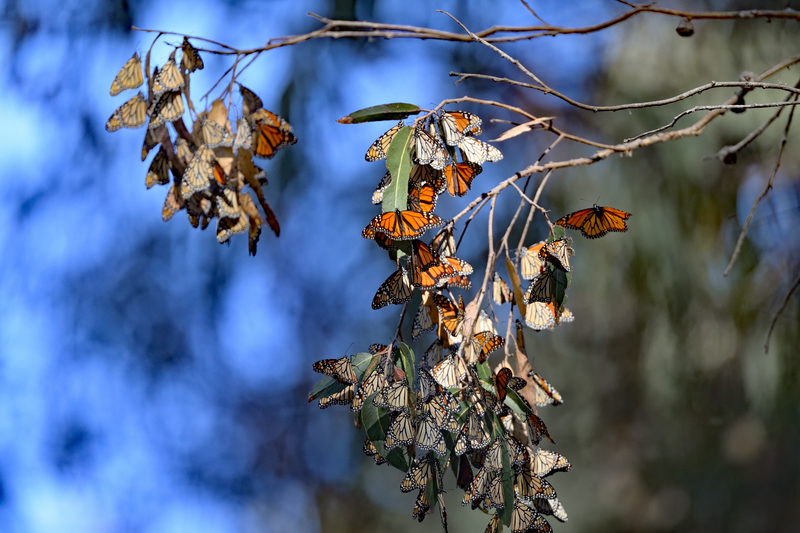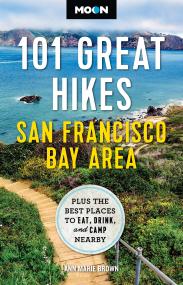Whether you’re looking for spring wildflowers or fall migratory birds, find your perfect Bay Area hike with this list of the top hikes by season.

Spring
- Sea to Sky and Raptor Ridge Loop, Napa and Sonoma: Savor magnificent views of the rugged Sonoma coast from the Jenner Headlands’ flower-filled coastal grasslands.
- Taylor Mountain, Napa and Sonoma: From March to May, commune with the wildflower blooms and flitting butterflies on this Santa Rosa summit hike.
- Big Rock Trail, Marin: In spring, Lucas Valley’s green valleys and rolling hills seem to stretch for miles, interrupted only by colorful lupines, poppies, blue-eyed grass, and monkeyflower.
- Purisima Grand Loop, the Peninsula and South Bay: Count the banana slugs as you circle around this lush streamside canyon with towering redwood trees and a fern-and-sorrel understory.
- Fall Creek Loop, the Peninsula and South Bay: Scramble over, under, and around fallen trees as this trail skirts the north and south forks of crystal-clear Fall Creek, which runs wide and full after winter rains.

Summer
- Hunters Camp Loop, Napa and Sonoma: When inland Sonoma County heats up, this Occidental redwood oasis provides a cool, shady respite on the “back side” of Sonoma Coast State Park.
- Jepson, Johnstone, and Beaches Loop, Marin: Sheltered from the Pacific wind by Inverness Ridge, this trail visits sandy beaches and Tomales Bay’s warm, shallow, swimmer-friendly waters.
- Bass Lake and Alamere Falls, Marin: This waterfall flows with peak vigor in spring, but summer is the ideal time to swim in spring-fed Bass Lake, halfway along the route. Wade in or leap off the rope swing.
- Stream, Fern, and West Ridge Trail Loop, East Bay: The East Bay can bake in summer’s heat, but this redwood-cloaked park benefits from the cooling influence of Pacific fog.
- Observation Deck Loop, the Peninsula and South Bay: Ramble through shady redwoods to a ridgetop observation deck with 360-degree views, then cool off in the San Lorenzo River’s swimming holes.

Fall
- Goodspeed/Nattkemper Trail to Gunsight Rock, Napa and Sonoma: Autumn days offer cooler temperatures for this sun-baked hike—and a chance to have Gunsight Rock’s precipitous perch all to yourself.
- Bald Mountain Loop, Napa and Sonoma: A moderate ramble through golden-grass meadows and leafy oaks leads to breathtaking vistas atop this summit in Sugarloaf Ridge State Park.
- Lake and Vineyard Trails to Fern Lake, Napa and Sonoma: See the grapevines turn gold and amber on this mellow ramble through author Jack London’s beloved Glen Ellen ranch.
- Abbotts Lagoon, Marin: Pack along your binoculars and a bird identification book for this easy Point Reyes trek, where you can spot hundreds of avian species during the autumn migration.
- Old Cove Landing Trail, the Peninsula and South Bay: The Bay Area coast is known for fickle weather—damp in winter, foggy in summer, and windy in spring—but autumn delivers the best chance of warm, sunny days for walking this trail’s rugged sandstone bluffs and gazing out to sea.

Winter
- Bootjack, Ben Johnson, and Hillside Trail Loop, Marin: Winter days at Muir Woods mean fewer crowds among the giant redwoods and the chance to see spawning steelhead or salmon.
- Murietta Falls, East Bay: If you’re craving a long hike in warm winter sunlight, head to the Ohlone Regional Wilderness and tackle this challenging trek to Murietta Falls, which flows only immediately after a rainfall.
- Lands End Coastal Trail, the Peninsula and South Bay: Winter days in San Francisco often bring the balmiest weather, and there’s no place better to savor Golden Gate Bridge views than along this blufftop trail.
- Sweeney Ridge via Mori Ridge, the Peninsula and South Bay: Pick a cool winter day for this shadeless, steady climb from sea level to a high ridge with 360-degree views of the northern Peninsula and Pacific coast.
- Monarch-Moore Creek Loop, the Peninsula and South Bay: Time your trip for late November to February to witness the wonder of monarch butterflies overwintering in a Santa Cruz eucalyptus grove.
Plan Your Trip
Local author Ann Marie Brown reveals the best Bay Area hikes, from the wildflowers of the South Bay to the redwood forests of Marin. Get a breath of fresh air with Moon 101 Great Hikes San Francisco Bay Area.
Newsletter Signup
By clicking ‘Sign Up,’ I acknowledge that I have read and agree to Hachette Book Group’s Privacy Policy and Terms of Use
Pin It for Later


